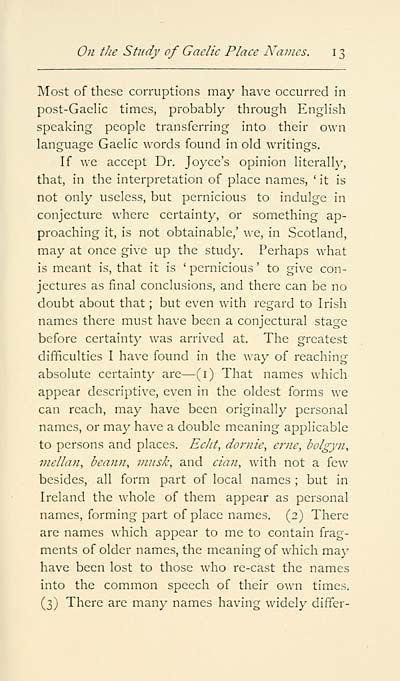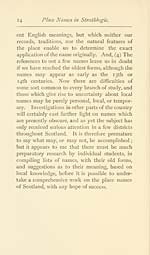Blair Collection > Place names in Strathbogie, with notes historical, antiquarian and descriptive
(33)
Download files
Complete book:
Individual page:
Thumbnail gallery: Grid view | List view

On the Study of Gaelic Place Names. 1 3
Most of these corruptions may have occurred in
post-Gaelic times, probably through English
speaking people transferring into their own
language Gaelic words found in old writings.
If we accept Dr. Joyce's opinion literally,
that, in the interpretation of place names, ' it is
not only useless, but pernicious to indulge in
conjecture where certainty, or something ap-
proaching it, is not obtainable,' we, in Scotland,
may at once give up the study. Perhaps what
is meant is, that it is 'pernicious' to give con-
jectures as final conclusions, and there can be no
doubt about that ; but even with regard to Irish
names there must have been a conjectural stage
before certainty was arrived at. The greatest
difficulties I have found in the way of reaching
absolute certainty are — (i) That names which
appear descriptive, even in the oldest forms we
can reach, may have been originally personal
names, or may have a double meaning applicable
to persons and places. Edit, doniie, erne, bolgyn,
mellari, beann, ninsk, and cian, with not a few
besides, all form part of local names ; but in
Ireland the whole of them appear as personal
names, forming part of place names. (2) There
are names which appear to me to contain frag-
ments of older names, the meaning of which may
have been lost to those who re-cast the names
into the common speech of their own times.
(3) There are many names having widely differ-
Most of these corruptions may have occurred in
post-Gaelic times, probably through English
speaking people transferring into their own
language Gaelic words found in old writings.
If we accept Dr. Joyce's opinion literally,
that, in the interpretation of place names, ' it is
not only useless, but pernicious to indulge in
conjecture where certainty, or something ap-
proaching it, is not obtainable,' we, in Scotland,
may at once give up the study. Perhaps what
is meant is, that it is 'pernicious' to give con-
jectures as final conclusions, and there can be no
doubt about that ; but even with regard to Irish
names there must have been a conjectural stage
before certainty was arrived at. The greatest
difficulties I have found in the way of reaching
absolute certainty are — (i) That names which
appear descriptive, even in the oldest forms we
can reach, may have been originally personal
names, or may have a double meaning applicable
to persons and places. Edit, doniie, erne, bolgyn,
mellari, beann, ninsk, and cian, with not a few
besides, all form part of local names ; but in
Ireland the whole of them appear as personal
names, forming part of place names. (2) There
are names which appear to me to contain frag-
ments of older names, the meaning of which may
have been lost to those who re-cast the names
into the common speech of their own times.
(3) There are many names having widely differ-
Set display mode to: Large image | Transcription
Images and transcriptions on this page, including medium image downloads, may be used under the Creative Commons Attribution 4.0 International Licence unless otherwise stated. ![]()
| Early Gaelic Book Collections > Blair Collection > Place names in Strathbogie, with notes historical, antiquarian and descriptive > (33) |
|---|
| Permanent URL | https://digital.nls.uk/81166742 |
|---|
| Description | A selection of books from a collection of more than 500 titles, mostly on religious and literary topics. Also includes some material dealing with other Celtic languages and societies. Collection created towards the end of the 19th century by Lady Evelyn Stewart Murray. |
|---|
| Description | Selected items from five 'Special and Named Printed Collections'. Includes books in Gaelic and other Celtic languages, works about the Gaels, their languages, literature, culture and history. |
|---|

